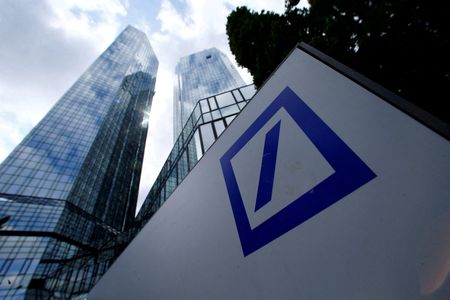
By Tom Sims and Frank Siebelt
FRANKFURT (Reuters) -Deutsche Bank capped its most profitable year in a decade on the back of a dealmaking boom, strengthening Chief Executive Christian Sewing’s hand as he prepares to lay out a new strategy and targets for the years ahead in March.
The surprise finale — analysts had been forecasting a loss for the fourth quarter — was the second straight annual profit following years of losses. But Deutsche was forced to shell out to keep its traders and dealmakers on board with compensation at its investment bank soaring 30% in the quarter.
Nevertheless, Thursday’s figures are a milestone for Sewing, who was promoted to the top job in 2018 to turn Deutsche around after a series of embarrassing and costly regulatory failings.
“This year we can finally prove to the market that we are sustainably profitable,” Sewing said in a message to employees.
Its shares were up 2.9% in early Frankfurt trading.
The net profit attributable to shareholders was 145 million euros ($163 million) in the three months ended Dec. 31. That compares with a profit of 51 million euros a year earlier, and topped analyst expectations for a loss of around 130 million euros.
The fourth quarter was the sixth consecutive in the black, the bank’s longest winning streak since 2012.
For the year, Deutsche made a profit of 1.94 billion euros, up sharply from 113 million euros a year earlier.
Despite the annual profit, the bank has still lost more than 10 billion euros over the past decade.
Sewing confirmed the bank was on track to achieve a key profitability target in 2022, a return on tangible equity of 8% that many analysts have forecast the bank will miss.
Analysts at Citigroup, which has a sell rating on Deutsche, said the bank’s targets are “overly optimistic” and that it didn’t see anything in the fourth quarter to change its view.
Analysts expect Deutsche to deliver profits in 2022 and 2023, consensus forecasts of their estimates show.
TALENT WAR
Once Deutsche’s sore spot, the investment bank has become an important revenue generator, benefiting from a pandemic-induced trading boom and a wave of dealmaking that has lifted banks across Wall Street.
Revenue at the unit rose 1% to 1.913 billion euros in the fourth quarter from a year earlier.
The investment bank’s advisory business stood out amid a dealmaking boom, with revenue surging 156%.
Revenue for fixed-income and currency trading, one of the bank’s largest divisions, fell 14% from a strong period a year earlier as markets calmed from their pandemic trading frenzy. That was in line with falls at U.S. competitors.
Some of the big U.S. banks’ fourth-quarter results have disappointed investors partly because of ballooning expenses, hurting profit growth.
The 30% increase in compensation and benefits at Deutsche’s investment banking unit from a year earlier was greater than the average 10% gain for the bank as a whole, a sign that it faces pressure to retain talent as the industry booms.
Sewing in 2019 announced 18,000 job cuts globally and the closure of some business lines in a major revamp to return to profit.
“Our plans were met with scepticism,” Sewing reminded employees in the letter. “Few observers were confident that we would be able to achieve such ambitious objectives within three and a half years.”
“Today we are proving that we keep our promises,” he said.
On Wednesday, the bank announced that it would pay a dividend for 2021, its first since 2018. It will also buy back shares.
The bank’s share price is up more than 30% over the past year.
($1 = 0.8917 euros)
(Reporting by Tom Sims and Frank Siebelt; editing by Christopher Cushing, Mark Potter and Carmel Crimmins)

